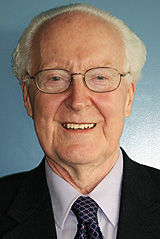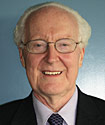
David Cook, Philetus E. Sawyer Professor of Science and professor emeritus of physics, will be honored Jan. 3-5, 2015 during the American Association of Physics Teachers (AAPT) national conference in San Diego, Calif.
The ATTP will recognize Cook with its Homer L. Dodge Citation for Distinguished Service. He has served as AAPT vice president (2008), president-elect (2009), president (2010) and past president (2011). He currently serves as chair of the AAPT’s meetings committee. He is the only Lawrence faculty member to serve as president of the AAPT, the country’s premier national organization and authority on physics and physical science education.
“I am both honored and humbled to be chosen for this recognition by the professional organization that has contributed substantially to my own growth since the beginning of my teaching career in the late 1960s,” Cook said of his distinguished service award.
Cook retired in 2008 after 43 years of teaching in the Lawrence physics department. He was elected a Fellow in the American Physical Society for his contributions to physics education in America in 2013, joining his long-time department colleague Professor Emeritus John Brandenberger as the only two physicists at Lawrence ever recognized as a Fellow by the APS.
“Professor Cook is a pioneer in developing an effective physics curriculum for liberal learning students,” said David Burrows, provost and dean of the faculty at Lawrence. “His methods have helped build an extremely strong physics program that has prepared many students for success in graduate programs and helped start them on distinguished careers. His work provides a wonderful model for colleagues at other institutions. We are extremely proud of his accomplishments.”
Cook’s AAPT service includes more than 40 years of meeting attendance and leadership on at least eight committees. While serving on the AAPT Executive Board, he generated detailed manuals for members of the presidential chain, and he took on the task of formatting and indexing the 250-page Executive Board Handbook compiled over several years by the Governance Review Committee.
One of his most important service legacies is PAC Tools. Cook was the impetus and leader of the advisory group that worked with staff to develop AAPT’s online program for planning meetings from abstract submission through the paper sort, to export into the final meeting program.
During his four-plus decade teaching career at Lawrence, Cook taught nearly every undergraduate physics course while leading the development and incorporation of computers into the physics curriculum. Beginning in 1985, he designed and built Lawrence’s computational physics laboratory with the support of more than $1 million in grants from the National Science Foundation, Research Corporation, the W. M. Keck Foundation and other sources.
He is the author of two textbooks, “The Theory of the Electromagnetic Field,” one of the first to introduce computer-based numerical approaches alongside traditional approaches and “Computation and Problem Solving in Undergraduate Physics.”
He was recognized with Lawrence’s Excellence in Teaching Award in 1990.
About Lawrence University
Founded in 1847, Lawrence University uniquely integrates a college of liberal arts and sciences with a nationally recognized conservatory of music, both devoted exclusively to undergraduate education. It was selected for inclusion in the Fiske Guide to Colleges 2015 and the book “Colleges That Change Lives: 40 Schools That Will Change the Way You Think About College.” Engaged learning, the development of multiple interests and community outreach are central to the Lawrence experience. Lawrence draws its 1,500 students from nearly every state and more than 50 countries.
 Cook, who retired as Philetus E. Sawyer Professor of Science in 2008 after 43 years of teaching in the Lawrence physics department, will serve as AAPT’s president in 2010 and past president in 2011. First elected to the association’s executive board in 2007, Cook is the first Lawrence faculty member ever to serve as AAPT president and the first from any Wisconsin college or university since 1955.
Cook, who retired as Philetus E. Sawyer Professor of Science in 2008 after 43 years of teaching in the Lawrence physics department, will serve as AAPT’s president in 2010 and past president in 2011. First elected to the association’s executive board in 2007, Cook is the first Lawrence faculty member ever to serve as AAPT president and the first from any Wisconsin college or university since 1955.